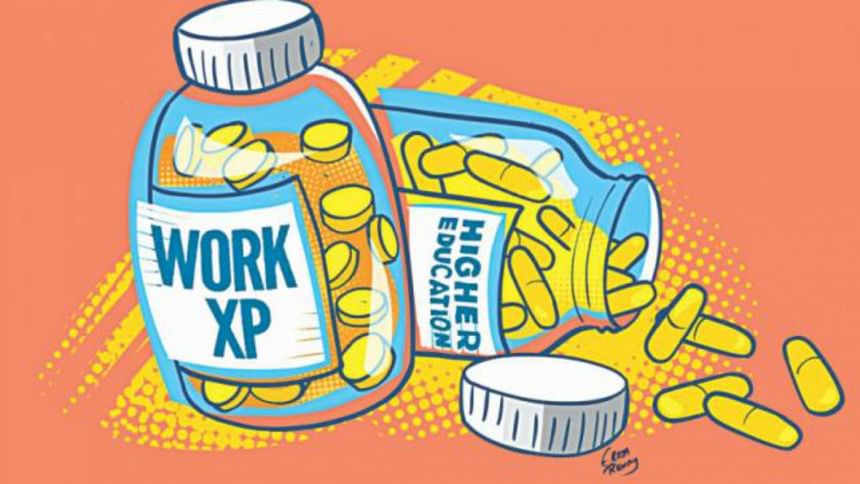The diploma disease of higher education

The hono-urable president of the country has been sounding the bell of alarm regarding the state of our higher education, with his recent comments at a convocation event on how "we do not want certificate-based higher education" and that teachers need to "play a more prompt, sincere and meaningful role in the acquisition, rearing, practice and distribution of knowledge." Both UNESCO and the World Development Report 2018 have issued a stronger warning signal. Higher education today is globally suffering from a quadruple crisis—low learning, fiscal crisis, "ethicide" or a lack of ethical concern, and the perils and promise of digital technology.
The world, reported UNESCO, is losing about USD 129 billion a year due to the poor quality of education— "The situation leaves one in four young people in poor countries unable to read a single sentence." The key element here is the low quality of teachers. It is, however, not the schooling system which is the driving force, as the World Development Report 2018 diagnosed, but a larger vicious circle. Universities in most developing countries, in general, produce low-quality graduates. These low-quality university graduates become poor school and college teachers and bring out other low quality school and college graduates. The trap snowballs, reproducing low- quality learning at every level.
The scenario is the same in Bangladesh. It is not that the University of Dhaka or other universities have not achieved progress. We have left far behind the situation of the late 1830s, when Scottish missionary William Adam in his Education Report for the East India Company observed that getting education for the children of Muslims was like "scaling the heavens". Many of our universities have access to e-resources. There are dozens of PhDs in every department of the major universities. We have a host of brilliant young scholars and a few islands of excellence. We now produce graduates by thousands and the long list of universities in the country was beyond our imagination even a few decades ago.
Yet our education system is locked into a spiral. The trap can be best described by borrowing a phrase from Ronald Dore, an eminent sociologist specialising in education, who has described it as "diploma disease". All our efforts today are directed towards getting diplomas—the higher, the better. This trap has its roots in a pre-colonial tradition that banked on mimesis and the colonial policy of education that took as its mission the production of clerks or at best "mimic men" as envisioned by Lord Macaulay (who famously replaced Sanskrit and Arabic, which he considered inferior languages, with English in colonial India), and has found its finest portrayal in Naipaul's novel "The Mimic Men" (1967). The post-colonial reality has been marked by what anthropologists Lloyd I. Rudolph and Susanne Rudolph called the rise of the students as a "demand class". In Bangladesh, it is nearly impossible for a political regime to stay in power without taming student politics. It entails strong government involvement in the university administration and student politics, which tends to distort the incentive structure of higher education. Political loyalty becomes more important than the pursuit of knowledge.
A brilliant student finds it difficult to get a job at a university without a political patron and a young academic soon discovers that students do not want to learn, that his peer group does not care for his academic performance, and that he has few friends unless he joins a "colour" (i.e. a political group in public universities) or adapts to the market-driven approach at private universities. Teachers with PhDs become professors within a decade of their career and in the absence of research funding or a good university library, they have nothing to do. Campus politics is the only route for upward mobility—to become a vice chancellor or win prestigious jobs in government bodies. So it is best to take the "exit" option, and those who remain only reproduce what they learnt at their foreign universities. All this results in the reproduction of knowledge dated by decades or even a century. Universities produce and reproduce dogmas and diplomas, not knowledge.
We have no effective and comprehensive national policy for ensuring quality in higher education. Although sporadic initiatives are being adopted, the crisis is so deep and multi-layered that only donor support or fragmented interventions are not going to solve it. What we need is a paradigm change in our higher education policy. As the University of Dhaka enters the second century, we must think hard and envision an integrated and pragmatic policy.
The first Industrial Revolution produced the landscape of poverty in Bengal—a land which was the sink of all the gold and silver of Europe. Starting from Latin America, this landscape of misery spread to most of Asia and Africa in the wake of technological breakthroughs in Europe. The fourth Industrial Revolution is certain to explode soon onto the very fabric of our society as artificial intelligence takes over the load of common jobs, leaving behind a vast, idle reserve of low-skilled university and college graduates. It is destined to produce another angry and violent landscape of relative poverty, not only in Bangladesh, but also over a large part of the Global South. We need to act and act fast if we want to cross the digital divide and prolong our fast pace of growth within the emerging global knowledge economy.
S. Aminul Islam is honorary professor at the department of sociology, University of Dhaka.

 For all latest news, follow The Daily Star's Google News channel.
For all latest news, follow The Daily Star's Google News channel. 



Comments